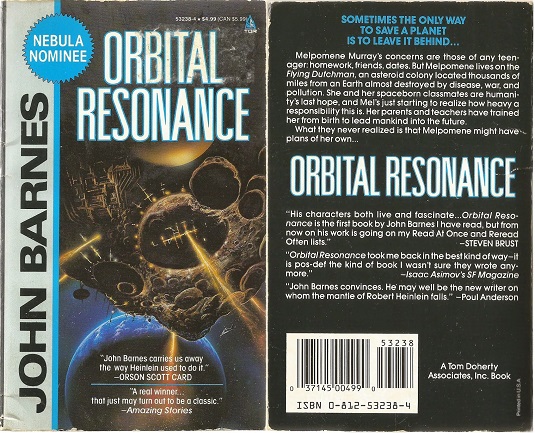
Apart from the the two Donaldsons earlier this year, this is the worst novel I've read since embarking on the SF quest. On paper, Barnes's book sounds intriguing. In the far off future of 2025, the world has been devastated by the "Eurowar", resource depletion, and a megadeath "mutAIDS" pandemic. On the plus side, a new spirit of cooperation is abroad. All nations have scrapped their arms, and an international effort is underway to colonise the solar system with a view to rebuilding society on Earth. Instead of being at loggerheads, humanity is pulling in one direction.
Melpomene is a 13 year old girl whose family has moved onto The Flying Dutchman, a hollowed out asteroid that plies the trading route to Mars. Free from the constraints of Earth, the crew are tasked with building a new society. Families were screened beforehand to admit certain personality types, who would end up raising children best suited for a particular niche in the burgeoning interplanetary society. Melpomene, for instance, finds out during the course of the book that she's being groomed for some kind of mayoral role while Randy, her sort-of boyfriend is primed for the officer ranks. Education consists of constant testing and being shuffled around temporary teams. This applies whether one is taking maths, Earth history, or playing aerocrosse - a low gravity sport where four teams compete but can (and do) make temporary alliances with one another. This, it is subsequently revealed, is to try and build a post-capitalist society by digging out the root of generalised commodity production: individualism. After scrapes arising from bullying, rivalries, flunking tests, and parental tension, the adult crew abruptly decide to get off the ship at Mars and leave - having decided their Earth-bound neuroses were drags on and causing dysfunctions among their children. The kids are so alright they can build socialism without their folks around.
That is all there is to the book. If it wasn't for the aerocrosse scenes, which read like badly bowdlerised and diluted battle sphere scene from Ender's Game, a race her Melpomene's brother wins on the outside of the rock, and the jarring insertion of future speak, this could easily be a twee high school drama. And nothing ever happens. The Heinlein comparisons are understandable (some might day because of his clumsy characterisation), but unlike Citizen of the Galaxy or The Moon is a Harsh Mistress, where the SF contrivances are central to the plotting, in Orbital Resonance they read like badly sutured grafts. This could, be forgiven if the rendering of dialogue and relationships were any good, but they're not. The cast is wooden and not believable, and that's fatal if the work wants the whizz bangs of cognitive estrangement to play second fiddle to the exploration of the human condition and character study. Melpomene, as a 13 year old school girl, is probably the least convincing viewpoint character I've ever read.
What really grates is the poor effort Barnes makes to address adult themes. The not infrequent swearing suggests this is not really aimed at youngsters. But piling on the cringe, if not the shudders, is the purient treatment of burgeoning sexuality. A few times Melpomene sees girls her age around her age naked, and Barnes has her pondering when she's going to start developing like her ample contemporaries. If that wasn't bad enough, this clearly pre-pubescent 13 year-old has a couple of masturbation scenes slotted int without any warning The past is a foreign country, not an alien planet. This was not acceptable in the early 90s, so what was Barnes, his publishers, and those who penned the sparkling reviews thinking it was fine to include them? These creepy asides make the book much worse and far from appropriate to the age groups this was aimed at.
There are three more books in this setting, with its sequel - Kaleidoscope Century - containing rape and murder, despite also being marketed at kids. Start as you mean to go on, I suppose. Of course, awful things happen and believable fictional universes often reflect the world to say something about it. Here, Barnes is saying nothing. This is a 198-page trudge through the humdrum lives of school children who never do anything interesting. As if to make up for it, Barnes turns authorial sex pest and we get voyeuristic glimpses a young girl's body. One to leave on the shelf unopened with, by the sounds of it, the rest of his Century Next Door series.
Image Credit
No comments:
Post a Comment
Comments are under moderation.